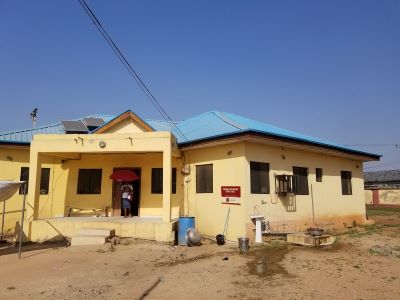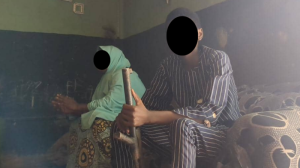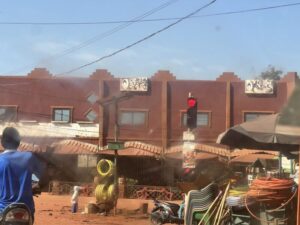Discrimination against Persons With Disabilities (PWDs),in healthcare centres can lead to unequal access to healthcare services. In spite of the passage of the Discrimination Against Persons with Disabilities (prohibition) Act, PWDs still find it difficult to access healthcare with ease.
The challenges or discrimination often begins with medical personnel lack of knowledge about PWDs, no provision for sign language interpreters or absence of assistive facilities like ramps among others. Many of these had watered down morale of PWDs from accessing medical care.
According to Rabi Mustapha Secretary, Karmajiji Disabilities community, “In my life, I swore never to go to any healthcare facility for treatment in Abuja again. This is because, of all the places I went, I was not well attended to”.
“Hospital personnel treat persons with disabilities as second hand citizens, most times, they ask you to be on queue, wait on the line like others regardless of our health condition. We can say “However, there are changes to this approach the interventions from Non-Governmental Organisations (NGOs) and relevant agencies but there is still a long way to go” Rabi Mustapha added
 Rabi Mustapha
Rabi MustaphaSharing a similar story, Ms Uche Andrew , the Gender and Disabilities Inclusion Officer at the Joint National Association of Persons with Disabilities, said that as a person with disability and a deaf person, assessing hospital care has been very difficult.
She said, “I am no longer interested in going to the hospital because the accessibility needs for me as a hearing impaired person are not provided for”.
“I must always make a personal arrangement for a sign language interpreter to follow me to the hospital at my own cost. We have pushed for this that the government should make it mandatory for hospitals to have sign language interpreters, yet nothing has been done about it” Uche continued.
“If we must move faster, government must ensure the full implementation of the Disabilities Act so our rights to health is protected” Uche concluded

Ms Uche Andrew
In the course of writing this piece, the writer visited many hospitals across the metropolis, it was discovered that some hospitals are not accessible for PWDs, because of the absence of ramps and other access facilities.
Where we found ramps or a form of accessibility structure within the basement, many consulting rooms located within the first and second floors are inaccessible
Some medical personnel who spoke to the News Agency of Nigeria (NAN) reporter on anonymity, said that there was no funding to effect some of the desired changes.
According to the Discrimination Against Persons with Disabilities (Prohibition) Act signed by former President Muhammadu Buhari, all forms of discrimination against persons with disability are prohibited.
The Act outlaws discrimination on the basis of one’s physical, mental or sensory impairment and makes provision to sanction anyone found violating it by either paying a fine of N100,000 or a term of six months imprisonment.
The law also stipulates a five-year transitional period for modifying public buildings, structures, and automobiles to make them accessible and usable for people with disabilities.
Additionally, the law establishes a National Commission for Persons with Disabilities (NCPD), responsible for ensuring that people with disabilities have access to housing, education, and healthcare.
Investigation revealed that the Disabilities law’s full implementation is still a concern. Ms Amarachi Chukwuma ,a Person With Disability, said “I get angry whenever I visit the hospital because of the discriminatory treatment PWDs get and this is because their rights are being denied.”
“A practical example is one of my deaf friends that went for antenatal, during her pregnancy, because there was no sign language interpreter, she did not hear what the medical personnel were teaching on what mothers should do or not do, she slept off because she was not carried along”

Ms Amarachi Chukwuma
Women with disabilities needs consideration
The challenges of persons with disabilities, especially women, are myriads. To Chukwuma, women with mobility challenges suffer untold hardship in a bid to access many buildings even if worship centres are not accessible in most cases.
“A friend of mine went to the hospital but could not see a doctor because there was no ramp that could grant her access to doctors’ consulting rooms, often to see the doctor, men often opt to help her. Associated with this support are occasional harassment where the helpers’ may mistakenly or intentionally touch her breasts. When you try to raise an issue, the feedback is often negative or inhuman “are you not happy that somebody is even touching?
Sexual and Gender-based Violence (SGBV ) is a major challenge Women with disabilities experience. They are easily harassed and people see nothing wrong with it. Many of such offenders often think they are doing the victims a favour.
Sometimes when women with disabilities visit hospitals they are least taken care of. Most times, hospital visits for antenatal care come with lots of humiliation and other associated mental health issues. Some supposedly ‘concerned persons’ will look at them and say “with this disability, you go carry belle? Who give you belle? (Meaning with this disability you got pregnant? Who impregnated you?)
Chukwuma encouraged Nigerians to learn to see PWDs as humans with blood flowing through their veins and that they have feelings too, rather than seeing them as curses.

Ms Rasheedat Isah
Ms Rasheedat Isah, a person with disability in Kuje, said going to the hospital as a PWD has never been easy and this made her feel uncomfortable in terms of using modern medical treatment.
“Medical personnel have this nonchalant attitude towards attending to PWDs because they feel we are wasting their time” said Ms Rasheedat .
Mere reading their body language will show it all “You could loudly read their unspoken words like, even you too get pregnant” So I will rather avoid hospital if it is possible, ’she said
What do women with disabilities really want?
The PWDs community, especially women, called on citizens to have an attitudinal change and work on their perception of PWDs. They also called on the government to be strict and ensure compliance to the Disabilities Act and apply sanctions where necessary.
Government should make it compulsory for PWDs to be attended to with respect and given priority service delivery as it is obtainable in the Acts, By this, the discrimination against PWDs would be checked.
Photo credit: NHW and online
This investigation is for the GENDER, THE AGENDA project of Gender Strategy Advancement International (GSAI) supported by the Wole Soyinka Center for Investigative Journalism (WSCIJ), and the MacArthur Foundation.



